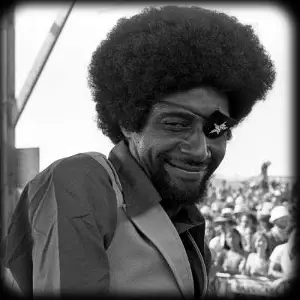JAMES BOOKER
 James Booker was right up there with the best pianists New Orleans has ever produced, and when you consider that other candidates might include Fats and ‘Fess‘, Toussaint, Dr. John, Huey Smith and Harry Connick Jr. you know that is high praise indeed. James could make his organ or piano sound like a whole band, and his strong left hand made bass players run for cover. His incredibly complex and deeply soulful playing style was capable of throwing a classical line, a ragtime riff and a Gospel refrain into a single piece, and then making it all fit perfectly into the same groove, as if all music was composed that way. Or, summed up in Dr. John’s immortal phrase, he was “a black, gay, one-eyed, junkie piano genius!”
James Booker was right up there with the best pianists New Orleans has ever produced, and when you consider that other candidates might include Fats and ‘Fess‘, Toussaint, Dr. John, Huey Smith and Harry Connick Jr. you know that is high praise indeed. James could make his organ or piano sound like a whole band, and his strong left hand made bass players run for cover. His incredibly complex and deeply soulful playing style was capable of throwing a classical line, a ragtime riff and a Gospel refrain into a single piece, and then making it all fit perfectly into the same groove, as if all music was composed that way. Or, summed up in Dr. John’s immortal phrase, he was “a black, gay, one-eyed, junkie piano genius!”
‘Gonzo’ had a real 60s feel;
The 60s saw James release some good selling singles and he was in great demand as a side-man for people like Joe Tex, Little Richard and BB King. The good times were brought to a shuddering halt by a drug conviction in 1970 which saw James incarcerated for a year. One of his legal counsel was Harry Connick Sr. and part of James’s rehabilitation seems to have involved giving the tiny Harry Jr. piano lessons! During the 70s, James worked with Dr. John, John Mayall, Jerry Garcia and The Doobie Brothers, and along with ‘Fess’ and Tommy Ridgley he became a mainstay of the New Orleans Heritage Festival. In 1976, he cut his album ‘Junco Partner’, and was then welcomed with open arms in Europe, recording in Germany, Switzerland and with the BBC in London. He stayed across the pond for over two years, often billed as ‘The Black Liberace’, complete with candleabra. Constantly gigging and recording in front of audiences who were amazed by his subtle, complex technique, as he riffed around Chopin’s ‘Minute Waltz’, dragging it out like a cat-house Blues, then furiously completing it in double time .
James gives the 88s a workout at The Maple Leaf;
James returned to New Orleans sporting a glittering eye-patch, and took up a long residency at the Maple Leaf Bar that became the stuff of local legend. The albums ‘Spider on the Keys’ and ‘Return of the Bayou Maharajah’ recorded at this time show a man of undiminished talent, even though his mind and body were failing due to long-term heroin use. He played at the Maple Leaf until a few days before he passed away from renal failure in 1983, at just 43 years of age. A documentary film about James Booker’s life, ‘The Bayou Maharajah’ has been completed and shown at Film Festivals around the world, and as a DVD release.